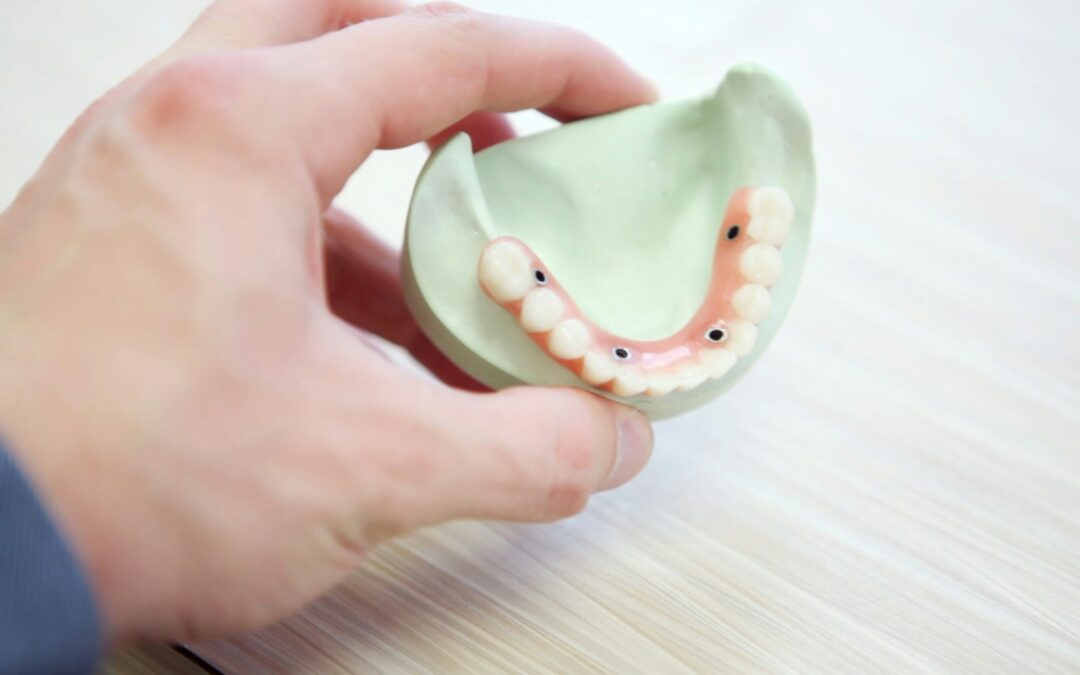You’ve probably heard about dental implants as a way to replace missing teeth, but you may not know exactly what makes them different.
Maybe you’re wondering if they live up to the hype or if they’re even an option for you. In this article, we’ll break down everything you need to know about dental implants, including the procedure, the benefits, and the risks, so you can make the best decision for your smile.
Why Choose Dental Implants?
Imagine biting into a crisp apple or flashing a confident smile without a second thought. Dental implants give you back that freedom by replacing not just the visible crown of your missing tooth but also the root.
The roots of your teeth stimulate the jawbone, which is essential for preventing bone loss and maintaining your facial structure. Without stimulation from the roots of your teeth, your jawbone can deteriorate, leading to a “sunken-in” look often associated with dentures. Dental implants are the only tooth replacement option that directly stimulates and preserves the jawbone.
Unlike dental bridges or dentures, implants integrate into your jawbone, offering a more permanent and stable solution.
If you’re concerned about how the health of a root canal might impact your jawbone, dental implants could be a viable solution. Here are some of the advantages of choosing dental implants over other tooth replacement options.
- Durability: Dental implants are remarkably durable and can last a lifetime with proper care, making them a valuable investment in your long-term oral health.
- Natural Look and Feel: Crafted to blend seamlessly with your natural teeth, dental implants restore your smile’s appearance and function.
- Improved Speech: Missing teeth can hinder clear pronunciation. Since dental implants function just like natural teeth, they eliminate this concern, allowing for effortless and articulate speech.
- Enhanced Comfort: Implants eliminate the discomfort and slipping sometimes associated with dentures because they become a permanent part of your mouth.
- Easy to Maintain: Caring for dental implants is as simple as brushing, flossing, and scheduling regular dental checkups—just like you would with natural teeth.
The Dental Implant Procedure
Dental implant surgery, when performed by an experienced surgeon, is a safe, predictable, and well-established procedure. Together, let’s break down the dental implant procedure into manageable steps.
1. Initial Consultation and Planning
Your journey begins with a consultation where we will review your medical history, take X-rays, and evaluate the health of your jawbone and any remaining teeth. This thorough assessment will help us determine if dental implants are the right fit for you.
This is also the perfect time to ask any questions you may have. Here at Walnut Grove, we always encourage open communication and are more than happy to address any of your concerns. Remember, knowledge is power, especially when it comes to your health.
2. The Dental Implant Placement
If you’re a good candidate, the next step is the surgical placement of the implant into your jawbone.
This procedure is typically done under local anesthesia to minimize discomfort. The implant itself is a small, titanium post that serves as the artificial tooth root.
3. Osseointegration: a Time to Heal
In the following few months after implant placement, your jawbone will undergo osseointegration, a process where it fuses with the dental implant surface.
This fusion creates an incredibly strong bond, just like the roots of your natural teeth. It’s what makes dental implants so successful. Osseointegration is a testament to the remarkable ability of the human body to heal and adapt.
4. Placement of Abutment
Once your jawbone has fully healed and fused with the dental implant, we’ll place an abutment.
This small connector serves as an interface, attaching the replacement tooth, or crown, to the securely embedded implant. The abutment ensures a seamless transition between the implant and the crown.
5. Artificial Tooth Attachment
The final step in the process is attaching the artificial tooth. Here, we’ll take impressions of your mouth to ensure a perfect fit for your bite and aesthetics.
The artificial tooth, or crown, is carefully crafted to match your existing teeth, giving you a natural-looking smile.
How Long Do Dental Implants Last?
With proper care and maintenance, dental implants can last a lifetime, proving to be a worthwhile investment in your oral health. This incredible durability is due to the unique property of titanium, the material used in implants, which fuses with your jawbone.
This fusion creates a strong and stable foundation for artificial teeth. Other tooth replacement options, such as bridges or dentures, may require replacement over time. Meanwhile, dental implants offer a permanent solution.
How Painful Are Dental Implants?
One of the most common concerns about dental implants is the level of pain involved. Rest assured that, during the procedure, you’ll be under local anesthesia, ensuring a painless experience.
With us, you can even opt for sedation dentistry, where you’re relaxed but conscious, under general anesthesia, which puts you completely asleep. These options provide flexibility and allow you to choose the level of sedation that best suits your needs and preferences.
While there may be some discomfort after the anesthesia wears off, most patients find it manageable with over-the-counter pain medication. If you have concerns about pain management, feel free to discuss them with us. We can provide personalized recommendations and address any concerns you might have, making your experience as comfortable as possible.
Throughout the process, don’t forget to focus on the end goal – enjoying all those delicious meals you love once your mouth heals.
Are You a Good Candidate?
If you’re missing one or more teeth and are in generally good health, you are likely a candidate for this revolutionary treatment treatment. Even if you have a thinner jawbone, a bone graft can provide the necessary support. This is a common procedure that adds more bone to areas that need it.
While the success rate of dental implants is high, certain factors can impact the outcome. These factors highlight the interconnectedness of your oral health and your general well-being, including:
- Smoking: This can hinder the healing process, potentially reducing the success rate of your implants. It’s generally advised to refrain from smoking throughout the entire implant process and, ideally, beyond to promote optimal healing.
- Oral Hygiene: Maintaining excellent oral hygiene, including brushing, flossing, and regular dental visits, is crucial for the long-term success of your dental implants. Neglecting your oral hygiene can increase the risk of complications, including infection.
- Medical Conditions: Certain medical conditions, such as diabetes or autoimmune diseases, can affect the body’s natural ability to heal, potentially impacting osseointegration and implant success. Informing your dentist of any underlying medical conditions ensures they can provide tailored advice and care. This integrated approach to healthcare is exemplified by institutions like the Mayo Clinic, where continuing medical education emphasizes the importance of understanding the relationship between oral and overall health.
- Medications: Certain medications, including some corticosteroids, may interfere with the bone healing process. It’s important to disclose all medications and supplements you take to your dentist during the consultation to minimize potential risks and complications. Openly communicating your full medical history is essential for achieving the best possible outcome.
Regular dental cleanings are the keys to your success, whether or not you’re dealing with dental implants. Every one of our oral structures works in tandem, allowing us to nourish our bodies and enjoy good food.
Embrace Your Smile Today
Embarking on the journey of dental implants offers the promise of renewed confidence, enhanced quality of life, and the freedom to enjoy everyday activities without hesitation.
If you find yourself relating to the concerns and questions surrounding dental implants, know that you are not alone. Millions worldwide have benefited from dental implants, experiencing a significant positive impact on their lives.
If you live in the Langley area, we’d be delighted to meet with you to discuss your options and formulate the perfect care plan to meet your unique needs.

